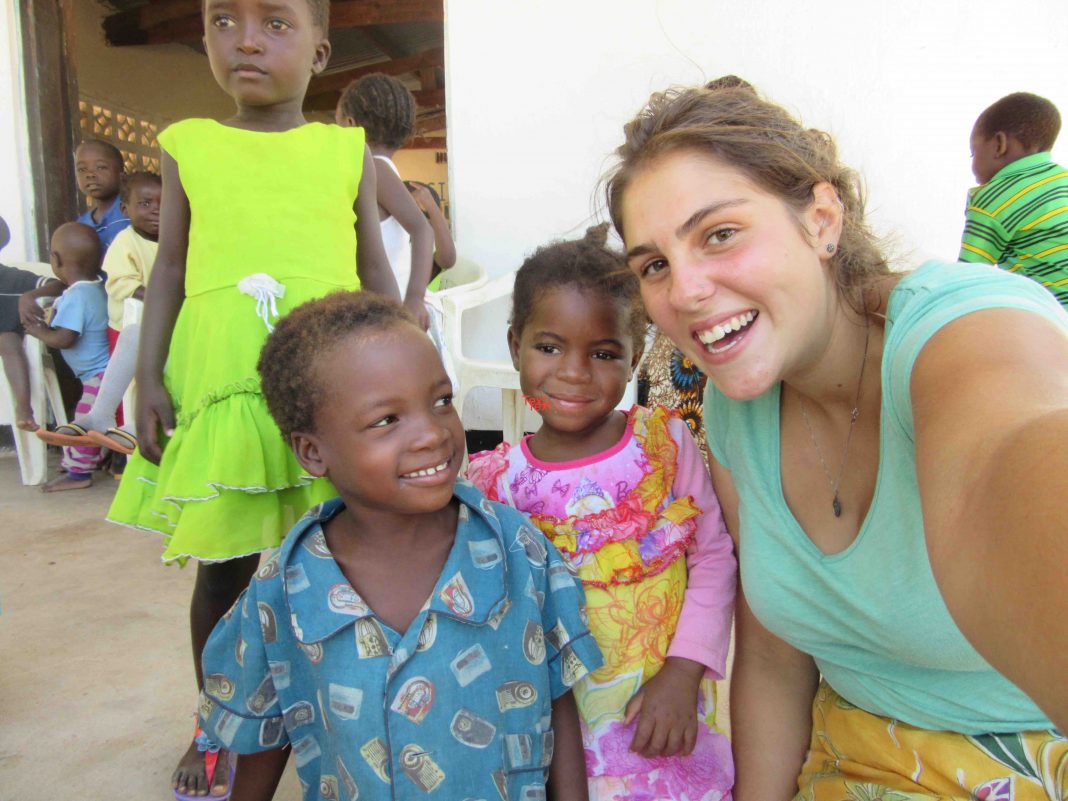A gap year in Africa set nursing student Devon Kilkelly on a path that this month saw her win $10,000 for a village that was her home for six months and now has a place in her life for keeps.
The second year nursing student at Otago Polytechnic recently featured on Seven Sharp as the winner of an ASB Good as Gold award of $10,000 for the village preschool she has supported since first working there in 2015.
Devon says she ended up in Africa because after she left school she had no idea of what to do, apart from some vague ideas about outdoor education. So the Greymouth 18-year-old opted to take a gap year in a completely different culture with the aim of making a difference at the same time.
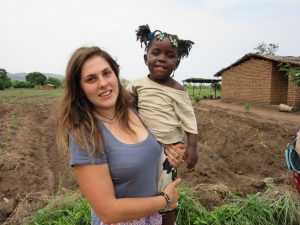
She ended up spending six months in 2015 as a volunteer in Ngara in Malawi – a fishing village of about 4000 people – where she taught biology and geography at the village high school, helped out at the local preschool (called Ngara Nursery) and worked at the local healthcare clinic.
The village and its ramshackle nursery captured her heart and led her to raise thousands of dollars to transform the nursery (see more below), but it was the healthcare needs of the people that captured both her head and heart and saw her choose nursing as a career on her return to New Zealand.
The village health centre had no running water and was staffed by a healthcare worker with limited training. This resulted in practices that the Kiwi school-leaver used to Western health standards knew were wrong, but had insufficient knowledge – or the standing, as a visiting teenager – to change. Practices such as poor hand sanitising, incorrect doses of medication given at the wrong intervals and treatments for a chief or a white person that differed from those given to people of lower status in the village.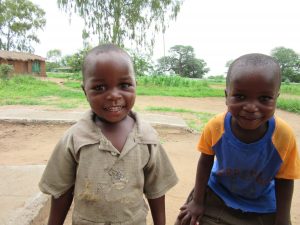
Seeing what a difference nursing could make to villages like Ngara inspired Devon’s career choice.
“My dream is one day to go back over there and implement roaming nursing education – that’s where you are going to make the biggest difference,” she says. “Because there are so many small villages in Malawi, if you go to those village clinics and implement the basics like hand hygiene, standard dosages and proper disposal of infectious material…”
For example, the village clinic was delivering the birth control injection Depo Provera to village women but not emphasising how important it was to have the follow-up injection on time. “The women were given the day for the follow-up injection but the importance of having the injection on that day and not leaving it for a week or two weeks would be lost in translation.”
Or the chief would be given double the doze required of quinine, as he was an important person, in the belief that he would be cured more quickly.
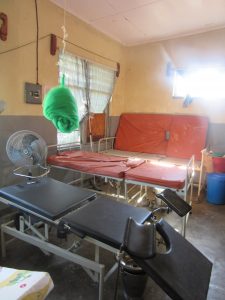 The neighbouring village had a larger medical centre, staffed by local nursing students, where Devon got to help deliver 12 babies. She also got to travel to the local city to observe three surgeries, although her initial planned visit was postponed as the hospital had no power that day.
The neighbouring village had a larger medical centre, staffed by local nursing students, where Devon got to help deliver 12 babies. She also got to travel to the local city to observe three surgeries, although her initial planned visit was postponed as the hospital had no power that day.
Nurses are few and far between in Malawi (World Health Organisation statistics for 2010 show that Malawi has 0.28 nurses per 1000 people, compared with New Zealand’s 10.7 per 1000 people) and Devon says the nursing students she met needed to work really hard to gain scholarships to be able to afford the three-year degree.
“It made me really want to educate myself as a nurse and continue to help people in New Zealand and also one day to be able to go back over there and share the education from my degree,” she says.
The second-year student is just finishing a paediatric placement, which she has been loving, and is keen to work in paediatrics, but with another year to go she is still open to all specialties.
Ramshackle nursery to stimulating learning environment
From her nursing studies, Devon now knows how important the first five years of a child’s life are, but as a teenager working in Ngara Nursery school, it was all too clear that urgent work was needed.
The nursery works as both a crèche and a pre-school for the village, where many women start work early in the morning in the maize fields to avoid the heat or make products to sell in roadside markets.
When Devon and her English fundraising partner Daisy first started working at the village nursery in 2015, it had large holes in the concrete floor, paint coming off the walls and a long-drop toilet without a door.
The children arrived hungry – poor village families usually skip breakfast and prioritise a large lunch and dinner. There were only five toys to share between 20 children, the teacher had no blackboards and no training, and the children had nothing to write or draw on. “It was very unstimulating and very dangerous actually,” says Devon.
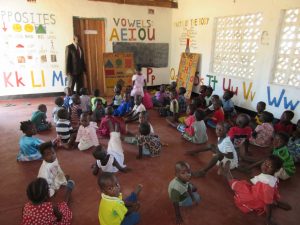 By the time Devon left, thanks to fundraising support from her and Daisy’s home town, the floor was fixed, the toilet had a door, there were wall-hung blackboards for the teacher, slates for the children, new toys and sports equipment and a safe water supply. The teacher was being funded to undertake some early childhood training and the children were having porridge for breakfast. “Now our roll has grown to 90 children – it is so big we are having to split into two different age groups.”
By the time Devon left, thanks to fundraising support from her and Daisy’s home town, the floor was fixed, the toilet had a door, there were wall-hung blackboards for the teacher, slates for the children, new toys and sports equipment and a safe water supply. The teacher was being funded to undertake some early childhood training and the children were having porridge for breakfast. “Now our roll has grown to 90 children – it is so big we are having to split into two different age groups.”
Devon says the nursery school is also very important to help prepare children for primary school, particularly as in Malawi the children in primary school are taught English right from the start. “But obviously their families speak to them in the local language, so a lot of the time the children don’t know any English and aren’t exposed to it until they start primary school. So they are lost and the school class sizes can be 80 to 100 students per teacher.
The nursery school provides the chance to give them a great ‘kick start’ before primary school and Devon says from her nursing studies she also now knows how important developmentally it is to stimulate children’s brains from a young age.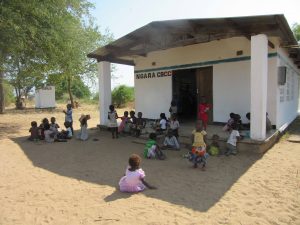
Since Devon’s return to New Zealand her support of Ngara nursery has continued – her commitment is one she hopes to continue for the rest of her life. “To feed a child a bowl of porridge is 8c a bowl and for 90 children five days a week that is $7.20 for a day – not much more than a takeaway coffee – or $36 for the week,” says Devon. “When you put it like that and then you think how many of us buy at least one takeaway coffee a week…”
Devon has sold electronic fly swats to raise funds; last year she ran the Dunedin half-marathon and this year she began reaching out to her new community of Dunedin to raise funds for further nursery goals, including continuing to provide the children with porridge and a teacher, a new building, more toys and learning materials, and a playground.
Thanks to Devon’s ASB Good as Gold win, some of those goals will now be met, with her plan being to use some of the money to renovate a community building 30 metres down the road as an extension of the nursery school. “It is just awesome that we are able to grow and house this expansion.”
She is also buzzing that the recent television coverage of her fundraising work for the nursery saw an Auckland playground company, Parks Supplies, offer to donate a playground for the nursery’s children.
“Now I’m in the midst of figuring out how to get it over to Malawi,” says an excited Devon. This is no easy task, but, based on her work to date, is certainly not beyond this 20-year-old ‘good as gold’ nursing student.
You can find out more about Devon’s project on her Givealittle page.
